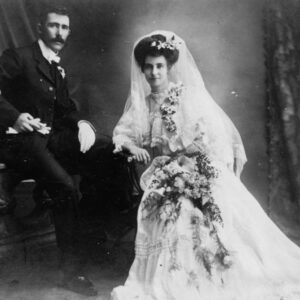The requirements are simple for a bride on her wedding day. They are so simple, in fact, children can recite them. Before heading down the aisle, she needs:
“Something old,
something new;
something borrowed,
something blue.”
But what about the groom? What should he have? Believe it or not, having a prosthetic limb handy can be a good idea. That’s the moral of an oddly-inspiring story from the Civil War.
That conflict is often called “The Brothers War.” It was literally true for siblings Henry and Levi Walker. They were extremely close. Both worked with their dad in a wool mill in Mecklenburg, N.C. They seemed destined to lead typically quiet, tranquil small-town lives.
Until the spring of 1861, which Abraham Lincoln later summed up with eloquent simplicity. “And the war came.”
Henry was 24, and Levi was 19 when they volunteered to serve in the Confederate army on May 20, 1861. You can’t help wondering how the news was received in their camp when their regiment was designated the 13th North Carolina Infantry. Heading into battle bearing the unlucky number 13 must have felt like an extra burden for the young recruits.
They received their baptism of fire at the Battle of First Manassas (also known as First Bull Run) in Virginia. And the fighting 13th was in the thick of it every step of the way from then on.
The affection the Walker boys shared for each other grew stronger as they endured the hardships of soldiering. Yet, it was also comforting having someone special there to share it.
They marched north in the summer of 1863 when Gen. Robert E. Lee decided to roll the dice and ordered them into Pennsylvania in what came to be known as the South’s “high water mark.”
Levi was carrying the 13th’s battle flag when the regiment marched into Gettysburg on July 1. It was both a big distinction and an equally big risk. Being entrusted to carry the colors into battle was a huge honor. It also made the flagbearer a conspicuous target. Sure enough, he was shot that afternoon. Levi’s left leg was amputated below the knee at field hospital the next day. Unable to be moved, he became a federal prisoner after the battle.
In one of those incredible ironies that sometimes happen, Henry was shot in Maryland two weeks later. His left leg was likewise amputated below the knee.
Despite their injuries, both brothers survived to return home and became successful. Henry graduated from New York Medical College, established a practice and opened a drug store. He married, had seven children, and lived to be 92.
Levi did well, too. He also married after the war, became a prosperous merchant, and reached the ripe old age of 93.
The bond that developed between the brothers in childhood and was cemented during wartime lasted into their old age. But one incident revealed the depth of feeling each had for the other. Which brings us back to weddings.
That ceremony is meaningful for both bride and groom, a unique mixture of extreme joy and intense jitters. Levi must have been battling a bout of the latter when his big day arrived. Because he slipped and fell that morning, shattering his cork leg. It was a major crisis; without the artificial limb, he couldn’t stand at the altar and exchange vows with his fiancee, Lenora Montgomery.
Then Henry came to the rescue. Since both brothers had sustained the same wound on the same leg, they used the same prosthetic device to get around. So Henry unstrapped his limb and gave it to Levi.
And so it was that Levi Walker can be said to be the only man in history to get married while standing on the leg of another!

